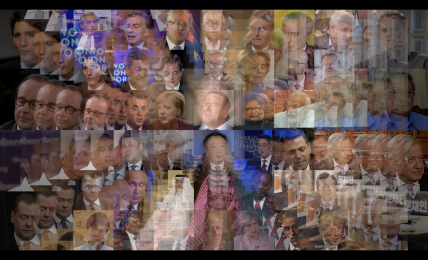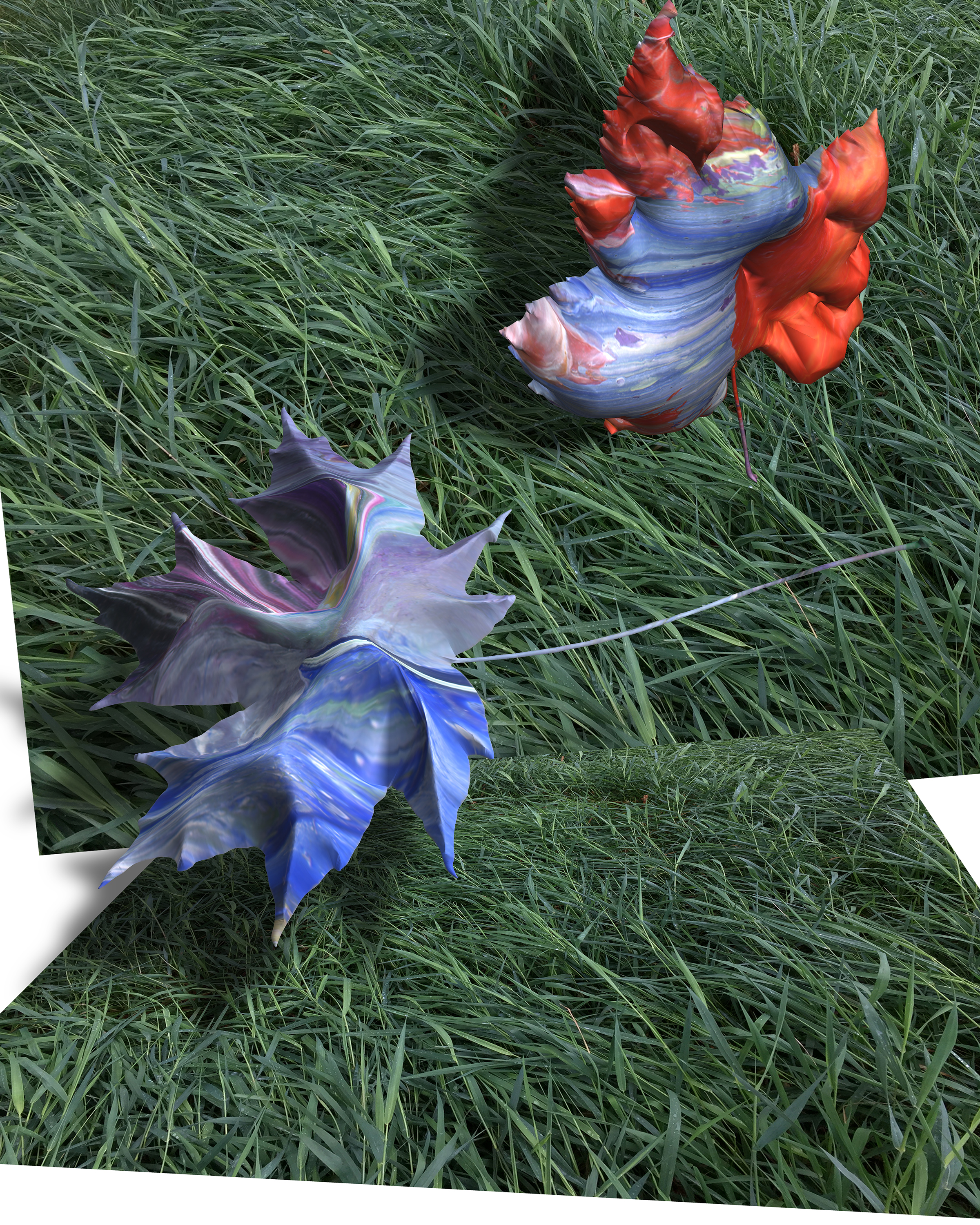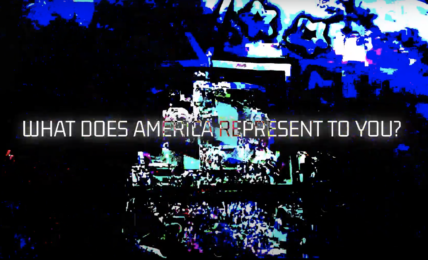Millennials are the first generation to grow up with the internet. The rise of the internet incited a significant transformation in the experience of adolescence, as continual access to the online world revolutionizes the way that young people develop a sense of self and find their places in the world. For lesbian, gay, bisexual, transgender, and queer millennials, who frequently feel alienated and ostracized by their families or hometown communities, the internet has opened up the opportunity to learn about their identities, find queer-specific resources, and gain supportive networks. Generations of LGBTQ youth have struggled to meet other young queer people like themselves. Now, queer millennials from big cities and small towns alike are growing up in a world where other queer youth are just one click, one YouTube video, or one Tumblr post away. However, even though the internet can be a welcome place of companionship and solace for queer youth, it can be equally cruel and challenging to navigate. According to a national survey of LGBTQ youth on the internet conducted by the Gay and Lesbian Student Education Network (GLSEN), one in four LGBTQ youth (26%) said they had been bullied online specifically because of their sexual orientation or gender expression in the past year.
In this collection of interviews, seven LGBTQ-identified individuals from ages 19 to 25 share their stories about their journeys of self-realization in the age of the internet. From Tumblr to porn, queer chatrooms to social media posts, these millennials have grappled with what it means to be queer in a digital age. Despite experiencing the internet as a site of both dangerous vulnerability and critical support, all could agree that the visibility and accessibility of other queer people, as well as queer media, history, and culture, greatly impacted the way they came to understand themselves.
Each interview was conducted digitally over text message or Facebook messenger, two of the methods that young millennials use to communicate most frequently. To preserve anonymity, some names have been changed or abbreviated.
:::
Canvas – They/Them – 19
How are the identities that you hold important to you?
My identities are important to me because I have a sense of pride and even empowerment with them, when I’m in a community with others who
identify similarly. I have a non-binary gender identify by being demimale, which for me holds the meaning that I’m partially male/masculine in some ways but also partially gender-neutral in other ways. So for me, that ambiguous space gives me the freedom to participate in activities and behaviors, like what I wear, what I say, how I act, because I want to do things that way, rather than I’m fitting a mold. It gives me the space to make my own path with what’s already present but in a way that I’m comfortable with. And it’s taken me a while to find this word for capturing how I want to describe my gender, and I feel just being able to name it will increase my confidence in owning who I am and connecting with others who may not identify the same way, but each of us experience similar feelings and thoughts unique to our journeys.
In regards to sexuality, I found an identity called androromantic which works a bit.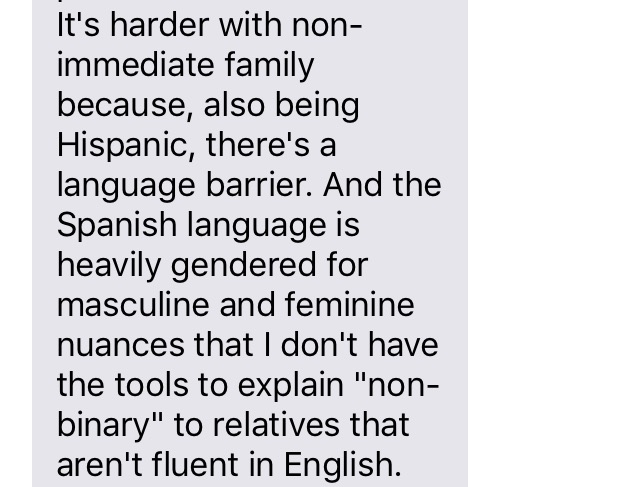 It means I’m attracted to those with masculine qualities, whether it be physical appearances or personalities, but it isn’t exclusive to cisgender men. So I can’t say I’m “straight” but simply calling myself “queer” for my sexuality feels lacking since I want to capture more specifically my sexuality. And it’s a sense of pioneering since I believe language needs to evolve for the new experiences we feel and even for the sake of updating what’s going on. Having these marginalized and “different” (since we’re all different, I’m using quotations here loosely) identities are important to me to break the binaries and absolutes that have been ingrained from society. It helps me to help others when I can come from this open-minded expanded awareness of myself and strike up conversations to get other people thinking that the labels we use to categorize people generally on first appearances are lacking, insubstantial, and can’t capture the full extent of another person’s identity or even who they are entirely.
It means I’m attracted to those with masculine qualities, whether it be physical appearances or personalities, but it isn’t exclusive to cisgender men. So I can’t say I’m “straight” but simply calling myself “queer” for my sexuality feels lacking since I want to capture more specifically my sexuality. And it’s a sense of pioneering since I believe language needs to evolve for the new experiences we feel and even for the sake of updating what’s going on. Having these marginalized and “different” (since we’re all different, I’m using quotations here loosely) identities are important to me to break the binaries and absolutes that have been ingrained from society. It helps me to help others when I can come from this open-minded expanded awareness of myself and strike up conversations to get other people thinking that the labels we use to categorize people generally on first appearances are lacking, insubstantial, and can’t capture the full extent of another person’s identity or even who they are entirely.
How did you first know that you were queer? Did the internet play a role in helping you figure that out??
Oh definitely! I come from a very open family so I wasn’t ever forced into a gender role or norm from my parents. Still with growing up, I sort of knew I had to be a “girl” because that was the body I had and it was what I learned from media, socializing with other friends, and just learning that there was this general, assumed, and acknowledged divide between boys and girls. I didn’t know then but that was the effects of the gender binary I was experiencing.
It wasn’t until the summer before my first year in college that I realized there are so many gender identities beyond “male or female.” I think being on campus in a new place helped me get away from everything I was used to (and all the subliminal influences on me). I just felt so free to be me that I guess I started feeling like I didn’t have to repress thoughts of “I should’ve been a guy” and I must’ve Googled something like “what if I feel like I’m not really a girl” and at some point I stumbled upon a wiki page that described androgynous genders and genderqueer and transgender. And my perception just expanded exponentially! All these words and identities and communities that I just never knew existed gave me comfort in knowing I wasn’t alone and my thoughts weren’t wrong. So the Internet gave me the avenue I needed to break out of a binary thinking and really a reality check that I was believing something that wasn’t accurate, and now I have a much larger, clearer perspective on gender. The Internet gave me the power to embrace myself and others that my hometown and family were not aware of or equipped to supply me with.
Are you out to your friends/family? What role did the internet play as you were coming out?
I’ve come out to my friends and family as non-binary. With more immediate family like my mom, my dad, and my older brother, I’ve spoken to them more honestly about being demimale. I have come out to friends about my identity as demimale. Technology in general helped there since I felt better messaging my friends individually than having a face-to-face or phone call. I’ve been more selective with friends that I’ve known longer since high school, and at UR with friends who are in touch frequently with Common Ground, since I feel they’re more accepting and open-minded and just able to have the capacity to understand what I’m saying than negating with “That’s not possible.”
It’s harder with non-immediate family because, also being Hispanic, there’s a language barrier. And the Spanish language is heavily gendered for masculine and feminine nuances that I don’t have the tools to explain “non-binary” to relatives that aren’t fluent in English.
Online, I’m out on Facebook. Someone could go through my profile and see that I have these gender identities listed for my gender. I openly post things related to “they/them” as my pronoun and also a great gender-neutral pronoun to opt for as a default. I’ve posted about being non-binary, and I haven’t received any negative feedback online.
I wouldn’t say I’m 100% out all the time in person, since my default when I meet new people is to say “I’m Canvas, I use they/them pronouns and I have a non-binary gender,” than saying demimale. I just feel like I need to test the waters after explaining what non-binary means if they don’t know what it is. And from there, gauging with what they say or react, I decide how “out” do I want to be.
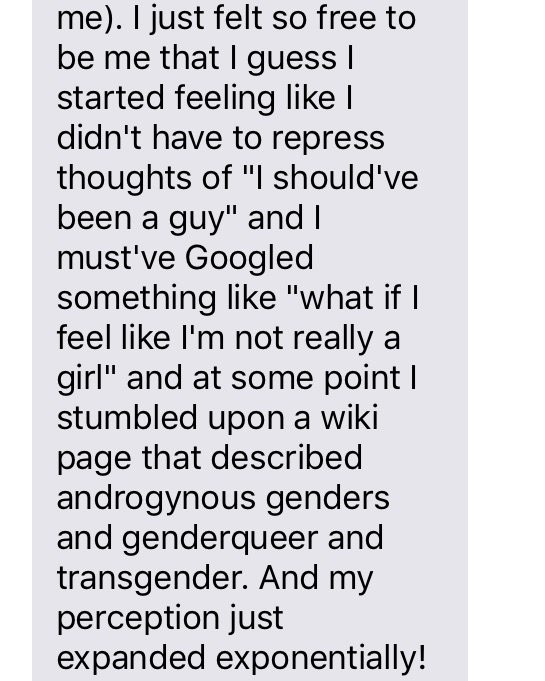 Do you still use the internet as a source for information about your own identity? As a place of support and community?
Do you still use the internet as a source for information about your own identity? As a place of support and community?
I do. I’ve spent so much time watching YouTube videos from FTM individuals and connecting over similar thoughts and emotions they went through.
I have found support through a Gender Spectrum Lounge chat group where I’ve meet others who may not necessarily be demimale but are queer in gender or sexuality. It’s a nice space to be connected to the community I’m part of.
I remember when I made the self-discovery of demimale being my identity, about 9 months ago, I found support online about what I could do to minimize the types of gender dysphoria I felt. And the Internet generally has been a source of support for providing information on the next steps I can take in bridging the gap between towards how I want to look so I can feel like I’m in my own skin, whether it be information from the process of a legal name change to hormone replacement therapy.
Have you ever been bullied over the internet (text message, social media, etc.)?
I haven’t. Most of my interactions over the Internet are in smaller spaces, like chat groups or merely looking up information on a website. I imagine if I went further to have a larger influence, like if I started posting YouTube videos, or did an online blog about my journey, I could face bullying. But so far I haven’t experienced anything.
How has the increased visibility of the queer community and representation of LGBTQ voices online/in media impacted you??
It’s given me a lot of comfort and hope. It’s reassuring to not be alone, and it’s especially powerful to see the extent and mass of the queer community that comes together for advocacy or support or just to be heard. I’m hopeful that a lot of things will change because of these actions and visibility. Like I remember reading an article how an Oregon judge ruled in favor of “non-binary” being a recognized gender identity. So even if there aren’t large-scale policies or even a consensus among those in positions of power, the visibility and advocacy of the queer community is a force to reckon with. Whether it’s small like shopping at LGBTQ-supportive stores and companies, or larger like voting and supporting political officials in cities that want to be progressive for the queer community, I have high hopes that there will be progress because of this visibility and action.
S. – She/Her & They/Them – 22
How are the identities that you hold important to you?
I suppose if I list my identities in no particular order, it’d be queer, genderqueer, disabled, Jewish, white… I’m also polyamorous, which intersects with my queerness in a huge way. My gender preferences in terms of sexuality and romantic love are pretty time-dependent. It’s never all the same, partially due to trauma unfortunately. My partners have been all over the map in terms of gender.
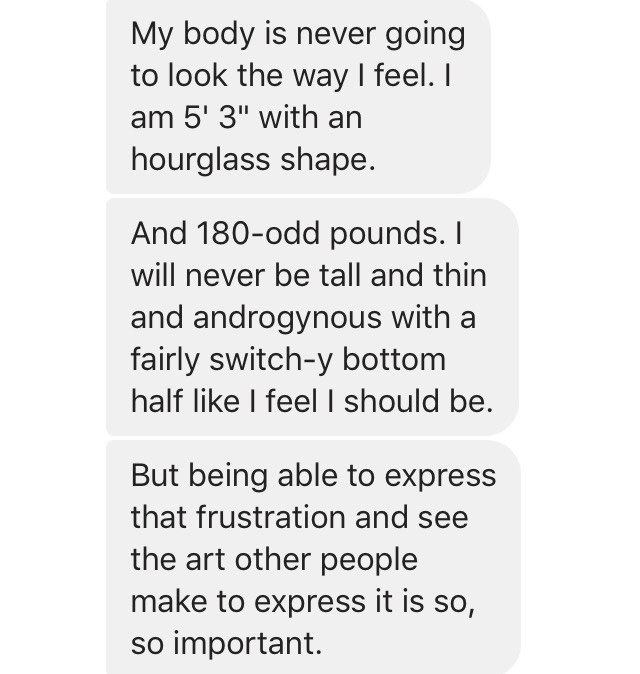 I use “genderqueer” because I honestly don’t have a better word. Sometimes I use non-binary or nb, because I know queer sometimes makes people uncomfortable. It’s also starting to gain traction in my academic world as something more than just sexuality. I’m a sociology major and a research assistant, so this often comes up. By uncomfortable I mean people use it as a slur. I tend to reclaim it for myself, but I try not to auto-apply it to other LGBTQ folks unless they say so.
I use “genderqueer” because I honestly don’t have a better word. Sometimes I use non-binary or nb, because I know queer sometimes makes people uncomfortable. It’s also starting to gain traction in my academic world as something more than just sexuality. I’m a sociology major and a research assistant, so this often comes up. By uncomfortable I mean people use it as a slur. I tend to reclaim it for myself, but I try not to auto-apply it to other LGBTQ folks unless they say so.
I think my disability comes first in terms of how much an identity affects my everyday life. I have fibromyalgia, bipolar II, Type 1 Diabetes, and PTSD. Recovered from an EDNOS. I have a lot going on! But my queerness in terms of gender and sexuality is always the first direct undercurrent.
I don’t present as genderqueer right now. I used to do work that let me be pretty androgynous; baggy pants and t-shirts with a sports bra. I used to be a theatre technician. Unfortunately due to the PTSD and fibromyalgia, I can’t work in theatre anymore. So now I’m an academic, and it is far easier to just present cis while I deal with all the other stuff going on.
I think I’m cursed, actually. Every time there comes a lull in things where I think I can deal with my gender presentation, something happens. It was the PTSD from my abusive ex last year, and the election this year.
How did you first know that you were queer? Did the internet play a role in helping you figure that out?
My relationship with sexuality and relationships has always been a bit weird. My mum tells me that when I was very young, like 8 or 9, I told her solemnly that “I don’t want to have a boyfriend, people that close can hurt you.” I have NO idea how I discovered that at 8 or 9. So that’s uh, context for where this is going.
Growing up my mother raised me with pretty typical liberal acceptance. One day I came home right after gay marriage was legalized in Massachusetts (I’d later meet the first pastor who married gay people in Massachusetts, where I’m from, but that’s a different story). And I told her “MUM. My friend got to DECORATE HER DADS WEDDING CAKE. I want to do that!!” And my Mum just stood there because I hadn’t even considered that that was something abnormal.
Later I’d sort of realize I had this crush on a girl in my class. I guess I was in 7th grade or so. I don’t remember not feeling queer, but I know I didn’t consider myself that at some point. I never told anyone. Freshman year of high school, when I came out, so did my first crush. As trans XD Later I’d have a small crisis, thinking that “Maybe I’m not queer, maybe I just knew Ben (the first crush) was Ben somehow!” One of my girlfriends at the time was like “Babe. Uhm. Pretty sure you’re queer.” (Point taken)
I definitely started thinking about sexuality from the internet. I read fanfiction, and there was smut. Lucky for me I knew how to Google and therefore didn’t end up with a terrible sex education from that (I also had decent taste). I was a tumblr person, still am really, and so I got exposed to all these sociological concepts and queer theory before I knew what they were. In retrospect I was in a very radical side of tumblr. I grew out of it, but I definitely took with me a sense of what queer meant in the outside world and within our culture.
I knew I was polyamorous since the beginning of high school. Probably before then, but that’s when I remember coming out. I found that resources on the internet that would help people understand; and eventually, my mother specifically. I don’t consider polyamory a particularly queer identity– I think a lot of LGBTQ people would be offended. It certainly is NOT oppressed. But it does help when your family knows. My mother doesn’t get it, but with some internet resources and a lot of talking… she still doesn’t understand, but she accepts it. I am incredibly lucky in that respect. (“Bring home whoever you want for Passover. Introduce them however you want. The family will just have to deal with it.”)
Gender related artwork has been my inspiration and hope. I’ve seen genderqueer artists make art and drag queens and kings perform; it’s accessible online and it always gave me hope. My body is never going to look the way I feel. I am 5′ 3″ with an hourglass shape and 180-odd pounds. I will never be tall and thin and androgynous with a fairly switch-y bottom half like I feel I should be. But being able to express that frustration and see the art other people make to express it is so, so important.
Do you still use the internet as a source for information about your identity? As a place of support and community?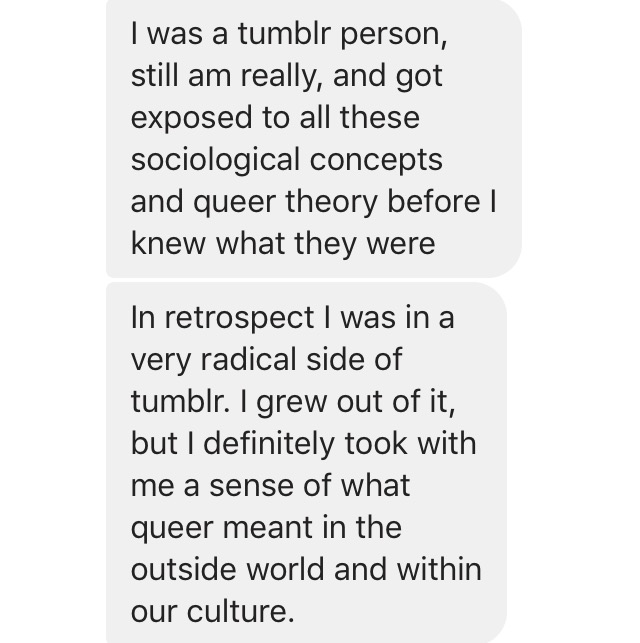
Not so much anymore. Most of my friends from high school who I stayed in touch with turned out queer in some way. In college, holy shit, I can think of only like three straight and cis friends. It wasn’t on purpose, it just happened. I don’t much need the internet for that specifically anymore. I do use it for disability support though.
Have you ever been bullied over the internet (texting, social media, etc.)?
Not for being queer. I don’t think intimidation and harassment from my abusive ex counts, but worth mentioning if it does? I went to an artsy high school and there wasn’t any visible homophobia. I got very lucky in that respect. Social media was also relatively new when I was in middle school. I spent most of middle school with a really old blackberry. I’m on that generational line where we can remember not having computers, but still would grow up with limited technology when we hit middle school. I think that makes a huge difference.
How has the increased visibility of the queer community and representation of LGBTQ voices online/in media impacted you?
It definitely helped normalize my own personal normal in the public sphere. I occasionally get frustrated because it often seems overwhelmingly white, cis, and abled—I am white, but I also study via an intersectional feminist lens, and I actively want to see other people get their voices out there. I’ve directly seen the high value in that (beyond basic human decency of not oppressing other people). It’s so important.
There are a lot of people who were inspirational to me. It was really important when I was younger. Now I’m pretty comfortable where I sit in all things but gender. It’s important that I still speak up and help others speak up. But it isn’t so vital to who I am.
What is your current experience online as a member of the LGBTQ community?
Currently, a lot of the community is petrified about the election. And in some ways, I am. But the sad part is? We can “take off” being visibly queer. People who aren’t white, or religious, or disabled, people who wear who they are on their skin permanently, cannot. I see a lot of white hysteria and it’s frustrating to me as someone who can’t “take off” disabled. I’m Jewish. I was taught how we survived. And I wish people would realize that in the face of death and persecution, they can publicly “take off” being visibly queer. They’ll never stop being queer, and I hope never stop fighting. But people should do what they have to do. Even if it means not living their truth. That’s survival. We’ve been doing this for centuries. One day we’ll get to the point where we never have to do this again. But right now, I think, I wish people would remember that it’s an option. You can be defiant and live your truth and be open in an increasingly darker society. And I’m not saying take it off *yet*. But at some points in history, you chose living who you are publicly, or risked being murdered. As brave as the first option is, it doesn’t let you fight another day.
O.K. – He/Him & They/Them – 25
How are the identities that you hold important to you?
My identities have gone from bi > gay > lesbian > queer > non binary genderqueer > non binary trans man. As of right now, I’m most in flux between navigating what exactly it means to be a queer, non binary trans boi. And like… how I see my ideal self as a femme trans man. Sometimes I rely a lot on “queer” as my umbrella term because I like the political weight that carries in terms of thinking about myself as a disruptive, destabilizing force. 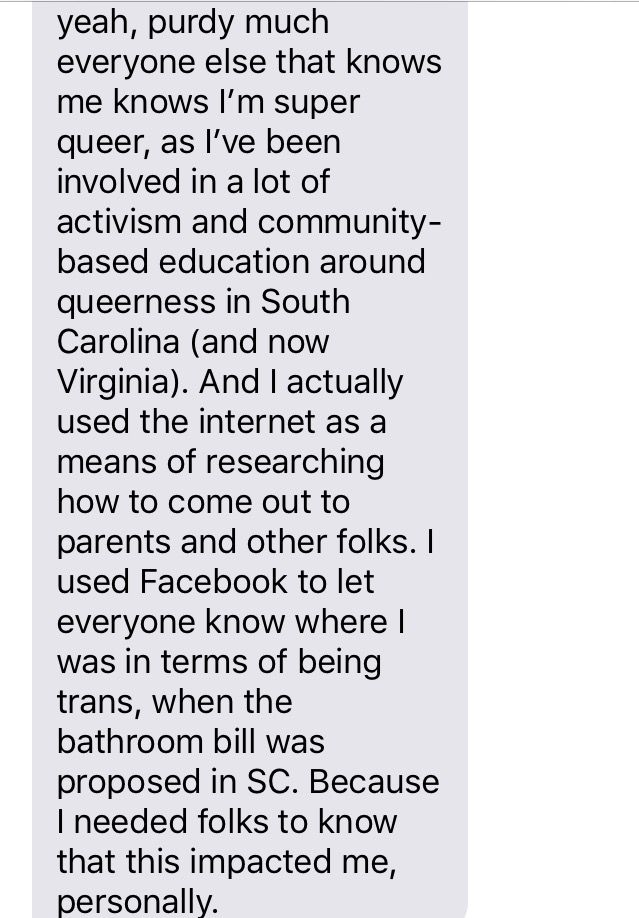 I don’t want to make it easy for folks to “know who I am” because that should only come with through sharing, not from assuming. I say that recognizing that I am also white, and that white queerness gets to just “be queer” as opposed to my POC friends, who have to navigate an intersectional queerness, and I constantly try to complicate my queerness by using it to also rupture the history of white, Western ideas about gender from within that whiteness. I also come from a small rural community, deep in the Bible Belt. So my queerness was my first understanding that not everything was as I was being taught. I think my queerness opened my eyes to a lot of the ways that systems of oppression work to control Others, and has allowed me a greater empathy for understanding across difference. When I tell folks that I’m working with incarcerated youth, now, they often tell me that they’re sad I’m not still working with LGBT youth. And I’m very quick to point out that queer youth exist in all spaces. That there are still (and a large amount of) queer youth inside of our justice system, and I’m there to be a resource for them there, too. But the assumption that I have someone “stopped” doing that work has been really interesting to navigate, and a lot of it has to do with those intersecting identities.
I don’t want to make it easy for folks to “know who I am” because that should only come with through sharing, not from assuming. I say that recognizing that I am also white, and that white queerness gets to just “be queer” as opposed to my POC friends, who have to navigate an intersectional queerness, and I constantly try to complicate my queerness by using it to also rupture the history of white, Western ideas about gender from within that whiteness. I also come from a small rural community, deep in the Bible Belt. So my queerness was my first understanding that not everything was as I was being taught. I think my queerness opened my eyes to a lot of the ways that systems of oppression work to control Others, and has allowed me a greater empathy for understanding across difference. When I tell folks that I’m working with incarcerated youth, now, they often tell me that they’re sad I’m not still working with LGBT youth. And I’m very quick to point out that queer youth exist in all spaces. That there are still (and a large amount of) queer youth inside of our justice system, and I’m there to be a resource for them there, too. But the assumption that I have someone “stopped” doing that work has been really interesting to navigate, and a lot of it has to do with those intersecting identities.
How did you first know that you were queer? Did the internet play a role in helping you figure out your identity?
“The internet made me gay!” is one of my favorite things to say. But in all honesty, growing up in a small rural town, and having been privileged enough to have a computer in the house from a young age (my mum was a nurse with a doctor who had a child my age and I played on the computer at their house. they were getting a new computer, and decided to give us the old one as a gift). Like a lot of digital natives I was the “tech wizard” of the house, and my parents relied on me to install the parental controls… meaning I knew all the passwords and how to delete internet history and ya know… the standard practices a lot of young queer folks experience on the internet even today. I was a big fan of a little show called Teen Titans, and there was a huge fandom community surrounding two of the female characters – Raven + Starfire. Because I identified really strongly with the dark, brooding, angsty Raven, I really dove into the fandom and through those conversations made a lot of online friends where I felt comfortable telling them about these feelings I had for other girls and about feeling like a boy sometimes. I think 12 year old me, navigating the internet as Oscar, knew more about who I was, seeing as how it took me until age 25 to finally navigate my way to that name officially. I sometimes wish I lived my IRL life as authentically as I did my virtual life back in the day. It has also shaped my perceptions of how online friendships can be healthy and necessary for the emotional development of young queer kids, who might not have access to community spaces (like in big cities) but nearly everyone has access to the internet in some way. But the very, very first moment I knew I was “queer,” well that’s been complicated by my trans identity. For years, I’ve situated that around the first time I had feelings for a girl, which happened in 9th grade. But now that I’m trans, I think it might have to be around the first time I had feelings for a boy (those feelings which, to be fair, I always described as feeling very gay), was in 7th grade on my childhood best friend. He was wonderful and kind and we spent a lot of time pretending to be Harry Potter and Draco Malfoy on the dirt roads of his farmhouse. And in terms of the first time I recognized my queerness as a trans experience, would probably be when I said I wanted to be a Dad when I grew up in kindergarten. Not like my dad, or to find someone to be a Dad, but just like to be a Dad.
Are you out to your family/friends? What role did the internet play as you were coming out??
Ha! I’m purdy out. Granted everything’s fluctuated so many times now, that no one knows if I’m straight now or not. But I just try to affirm my own feelings and attractions for folks. My father and I had our first conversation about me being a trans man and pursuing transition over Thanksgiving break, actually. And it went really well. He’s not really attached to my name, the way a lot of parents are, because he just really liked the initials O.K. and so he’d had two different gender names picked out for that. So I’m just switching them to the other choice. “They’d make a great basketball name!” he’s always said in regards to my initials, which I think has always been in his primary concern, that I love sports not that I was a particular gender lol. But he’s also been very supportive of me from a young age. My mother on the other hand…. has grown a lot. When I was a teenager, we had a really strained relationship over girlfriend stuff. She’s working on using nonbinary/gender neutral language. So for that I’m glad that I’m comfortable with non binary stuff, because I recognize that like there’s some difficult in navigating new language. And like, I’m glad that my identity has some space built in that for transition. Not that everyone’s does, just like, it doesn’t impact me negatively for her to use they/them because that feels validating to me, even if I know she doesn’t want to use he/him (right now). It’s the growth to me that matters, not the immediate change. But yeah, purdy much everyone else that knows me knows I’m super queer, as I’ve been involved in a lot of activism and community-based education around queerness in South Carolina (and now Virginia). And I actually used the internet as a means of researching how to come out to parents and other folks. I used Facebook to let everyone know where I was in terms of being trans, when the bathroom bill was proposed in SC. Because I needed folks to know that this impacted me, personally.
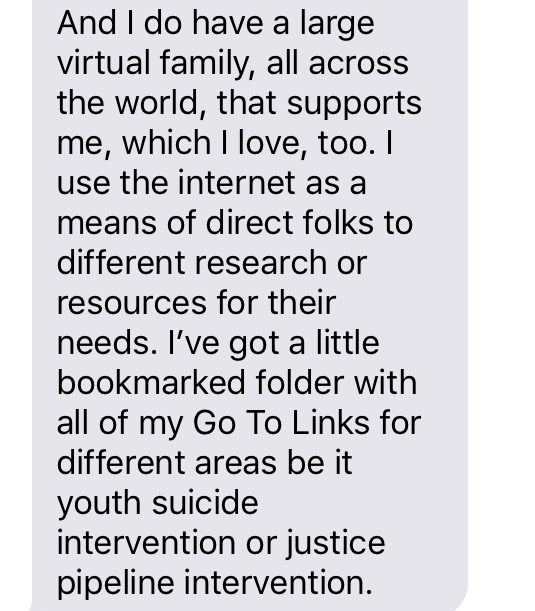 Do you use the internet as a source of information about your own identity? As a place of support and community?
Do you use the internet as a source of information about your own identity? As a place of support and community?
I’ve moved a lot of my activism and organizing offline and working directly with youth IRL. But the lessons I learned about communication, common language, and self-directed learning are all things I credit to my emotional development that happened online. I hope to eventually merge the two together and create a resource for vulnerable youth communities who want to self-organize with their friends and make political art and actions. And I do have a large virtual family, all across the world, that supports me, which I love, too. I use the internet as a means of direct folks to different research or resources for their needs. I’ve got a little bookmarked folder with all of my Go To Links for different areas be it youth suicide intervention or justice pipeline intervention.
Have you ever been bullied over the internet (texting, social media, etc.)??
Oh lawd yes. When I was in high school, I had my first serious relationship with a young woman, who came from a deeply religious background. I used to carry my video camera everywhere, but once we started dating, I put the camera away because she was nervous about there being any documentation that we had dated. In what can only be described as a twist of cruel irony, another student filmed us sharing an intimate moment and shared it online (via a very young YouTube link on a beta-Facebook account) to our student body. Since it was the early days of social media in the mid-2000s, it took a little longer for it to spread, but once it had, we had sort of been yanked out of the closet. Since I “looked more gay” we made a decision that we would tell everyone it had just been a mistake and that I had pressured her into the relationship, letting her live publicly as a straight girl who had been confused, and me sort of reify this myth of the predatory lesbian (which I didn’t even know was as stereotype, despite having been exposed to through movies, TV, and books). That led to more ostracization and bullying, and more than either of us realized would happen. It was pretty soul crushing, tbh, and pushed me into one of the darkest points of my life. But I made my master’s thesis about the experience, recognize it as trauma, and have reintegrated it into my narrative, which has made healing a lot more possible.
How has the increased visibility of the queer community and representation of LGBTQ voices online/in media impacted you??
(1) As a media maker, I do believe it is so so so very important that first and foremost we are supporting queer media artists, especially trans media artist of color, to tell their own stories. Someone else telling your story is representation, someone telling their own story is revolution.
(2) I think that increased visibility can come with both pros and cons, and discussion representations as only a positive sign of growth, can actually be really harmful. Take for instance that the majority of LGBT characters are in fact white, and out of the few trans characters (who are also, surprise, usually white) they are played by non-trans actors. This doesn’t help break down barriers, but actually just reifies a homonormative system of representation, that supports neoliberal capitalism. Simply put, having a gay character (who is white and assimilated very much into a “normal family”) on a TV show, brings in a very specific demographic of college-educated white women who see themselves as liberal and open-minded. Those characters are not being created to liberate queer folks, but rather being used to sell white women products. And while representation certainly matters, I think the modes of production and distribution are really crucial. And that requires have a constantly critical lens on the media that we consume. It doesn’t mean you can’t like what you like, but it just means that we can’t pretend its not complicated.
And (3) Yes. I know that being able to see myself in characters that weren’t even canonically queer, was a huge deal. And that actually the confirmation of Korra/Asami on The Legend of Korra and Ruby/Sapphire on Steven Universe, had tremendous, emotional impacts on me because those were aimed at younger (Y7) audiences. And just knowing that your image isn’t… damaging. Like… to know that you are not a harmful person just because you exist, is like really really validating. Does it solve everything? No. Does it give us a means of conversation and the potential to talk across difference? Absolutely. And at the end of the day, that education, of learning to understand across difference, is what changes culture.
Dan – He/Him – 20
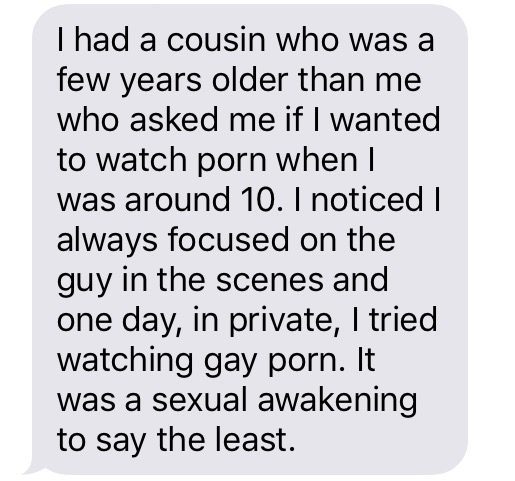 How are the identities that you hold important to you?
How are the identities that you hold important to you?
The strongest identity I have is probably my race. I’m an Asian American, but more specifically I identify as a Japanese American.
In terms of queerness I’m a gay cis gendered man. Interestingly enough I actually feel like being Asian American hurts me in the gay community. Not only are there very little representation in terms of media (it’s ok to be gay as long as you’re white), but I feel a lot of overt racism in terms of dating. When on apps like Grindr or Tinder, a lot of people express “preferences” of “no fats no blacks no Asians”.
How did you first know that you were gay? Did the internet play a role in helping you figure that out??
I had a cousin who was a few years older than me who asked me if I wanted to watch porn when I was around 10. I noticed I always focused on the guy in the scenes and one day, in private, I tried watching gay porn. It was a sexual awakening to say the least.
I’d say the internet also aided in me normalizing my feelings about being gay. I went to a Catholic elementary school and then a Southern Baptist high school so homophobia was actively taught to the student body. The internet allowed me to connect with other gay teens to express feelings of what we were experiencing and give mutual encouragement to each other.
Are you out to your friends/family? What role did the internet play as you were coming out?
I’m out to all of my friends but only to my immediate family. In Japanese American culture the concept of shame runs very deep. My parents expressed I could never tell my aunts, uncles, and grandma because it would bring great shame to our family. This is different than what my friends say that kept them from coming out. Some families use religion as a basis for homophobia, but with my family it was specifically the shame culture that is perpetuated.
The internet was a huge help for me in normalizing how I felt. I struggled with depression since I was in middle school and tried taking my own life 3 times before I graduated high school. I found the Trevor project through the internet and that has been an amazing resource. This is so cheesy but I used to watch coming out videos on YouTube to give me an idea of how my parents would react. Interestingly though, all the videos were of white families and all accepted their queer child outright. My experience coming out was not like that at all. My parents yelled and yelled at me for hours and my mom ended up shunning me for 6 months after I came out…
Do you still use the internet as a source for information about your own identity? As a place of support and community?
I would say so, but to a much lesser extent. I found other queer people who I can socialize with and build that community with in a psychical space. I do still utilize the internet to reminisce I guess about a time when i was clearly not in a good place and to contrast that with where I am now
Have you ever been bullied over the internet (texting, social media, etc)??
Never over the internet.
You already spoke a little bit about this, but how has the increased visibility of the queer community and representation of LGBTQ voices online/in media impacted you?
On one hand it’s been great to see one of my identities being more representative of the population in the media. On the other, I with the intersection of race and queerness would be represented as well. Overall, I’d say it’s a step in the right direction for giving young persons the courage to come out.
Rebecca – She/Her – 23
How are the identities that you hold important to you?
My identity as a queer (specifically lesbian) woman is definitely important to me because it completely shapes how I move through the world, how I see things, and how I am seen by others. I think that going to a university with a very strong queer community kind of spoiled me. In college, most of my friends were queer, and I interacted with other queer people almost every day, but now being in a fairly heteronormative office environment makes me feel sort of isolated as a queer woman, and I value my platonic queer friendships even more. I feel like I am more comfortable being my true queer self in spaces that are more queer-heavy, because even though I know that my straight coworkers are very accepting of queer identities, they don’t really understand the experience of queerness. In addition to my identity as a queer woman, my identity as a Reconstructionist Jew is incredibly important to me because it has shaped my values and principles, and it is the main reason for my decision to go into social work and my commitment to social justice.
How did you first know that you were queer? Did the internet play a role in helping you figure that out?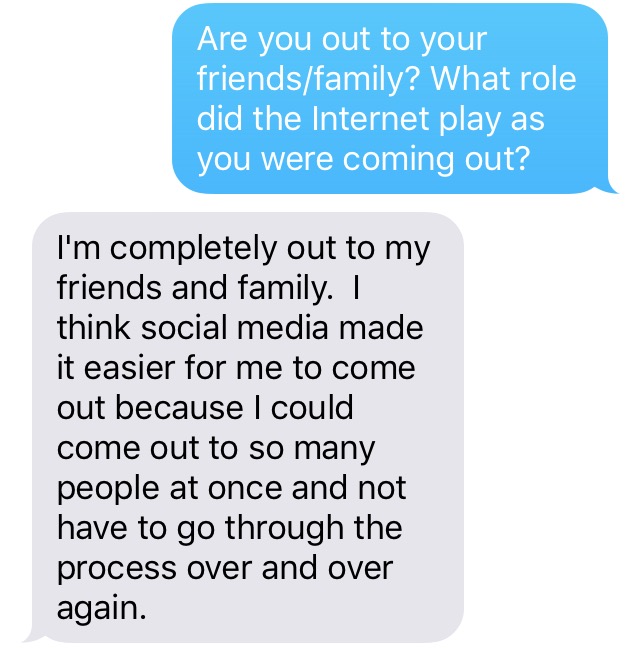
I first knew that I was queer when I was at Jewish summer camp, and the rabbi was giving a sermon about different types of love. Listening to that sermon, I realized that the way I felt about my cool, pretty counselor was, in fact, more than just platonic; I actually had romantic interest in her. I spent the rest of that summer sort of figuring out what that meant about me, and came to the conclusion that I must be bisexual (although several years later I would realize that was incorrect, and I was actually a lesbian). I was 14 when I had this initial realization of my queerness.
What have you learned about queer people and culture (if anything) from the internet?
So much! I’ve learned about identities I’d never heard of before (e.g. sapiosexual), and about intersections of queerness and other identities that might not affect me as much, like race or disability. But I think mostly what I’ve learned is how easy my life has been as a queer person. I grew up in Howard County, Maryland in a fairly progressive family, and so I never really experienced much homophobia or transphobia growing up, but the Internet has shown me just how hard it can be to be queer. I’ve read heartbreaking stories of queer people whose families and communities hate them and reject them because of who they are, and it keeps me from becoming complacent.
Are you out to your friends/family? What role did the internet play as you were coming out?
I’m completely out to my friends and family. I think social media made it easier for me to come out because I could come out to so many people at once and not have to go through the process over and over again.
Do you use the internet as a source of information about your own identity specifically? As a place of support and community?
I never did use it as a source of community before, because I didn’t really need to, but now that I’m no longer surrounded by queer folks, I do find myself using it to connect with other queer people.
Have you ever been bullied over the internet (texting, social media, ect.)??
I have not.
How has the increased visibility of the queer community and representation of LGBTQ voices online/in media impacted you??
It’s definitely made me feel more comfortable being openly queer, but on the other hand, it reminds me just how much we still need to do. I think it’s a good barometer of how much progress we’ve made.
Natalia – She/Her – 20
How are the identities that you hold important to you?
I openly identify as a Black-Ivorian Femme Lesbian. Identifying as Black and accepting being an African in America historically makes me within a diaspora that is not always Afro whatever or African – x country, but simply Black as an identity that transcends continents. My father was from Cote D’Ivoire specifically, so I add that African identity because most African Americans do not know specific countries of origin.
I identify as Femme as an allegiance to my Lesbian identity rather than a gender identity (a theoretical concept I am at odds with at the moment).
What may stand out is that I do not identify as Queer or queer and never will (in comparison to my girlfriend who will say that for herself) because I see Lesbian as an extremely empowering term that is not used as often because it scares people – hence why I use it.
For example, on our LGBT panels at my university, out of about 30 last year I was the only one who identified as Lesbian, most identified as q/Queer
As of this summer, I have started openly identifying as [dis]abled. The [dis] exemplifying the social model of looking at disability as a construct. My bouts with making it an open identity to share was the stigmas within disability discourse and social expectations of who gets to be disabled (physical vs mental)
How did you first know that you were a lesbian? Did the internet play a role in helping you figure that out?
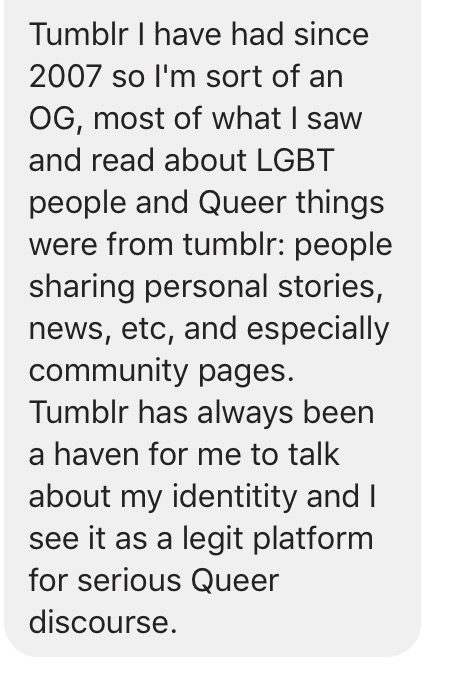 For me to identify as Black first and foremost is most important when it comes to cultural politics: within my community, those outside it, and those intersecting. I identify as a Lesbian secondly because q/Queer has become such a catch all term and I feel Lesbian empowers me and those that aren’t exactly Queer. I see Queer as a verb rather than identity- a continually acting and existing force against heteropatriarchy and cisgenderism, etc the confines sexuality has been framed from.
For me to identify as Black first and foremost is most important when it comes to cultural politics: within my community, those outside it, and those intersecting. I identify as a Lesbian secondly because q/Queer has become such a catch all term and I feel Lesbian empowers me and those that aren’t exactly Queer. I see Queer as a verb rather than identity- a continually acting and existing force against heteropatriarchy and cisgenderism, etc the confines sexuality has been framed from.
I think I always kinda knew. When I was a kid, I went to the YMCA and there was a counselor in their teens that I was so enamored with and had breasts and I just touched one one-day, like a poke, over their shirt, not thinking it was a huge deal. I was under the age of 5 but that’s one example. A more concrete one (that is also stereotypical) is that I fell in love with my best friend freshman year college and couldn’t shake the thought that there was anything better than women.
Are you out to your friends/family? If so, when did you come out? What role did the internet play as you were coming out?
I am out, and since the best friend thing in spring 2015 have been out to friends and people I meet, family not until this summer because my girlfriend pushed me into it. Ended up well tho lol.
Tumblr I have had since 2007 so I’m sort of an OG, most of what I saw and read about LGBT people and Queer things were from tumblr: people sharing personal stories, news, etc, and especially community pages. Tumblr has always been a haven for me to talk about my identity and I see it as a legit platform for serious Queer discourse.
Do you use the internet as a source for information about your own identity? As a place of support and community?
I’m at a point now where I’m not searching what x identity is or anything. But come to understand things and new identities from dialogues within Queer spaces on campuses, through nonprofits, etc.
The internet and my gender and sexuality I use as a place of support mainly and because I’m so into Queer studies, finding free pdfs on related research.
Have you ever been bullied over the internet (texting, social media, etc.)?
I have not been bullied. I was a bully in middle school when ‘fag’ was cool and everything was ‘gay’. But middle school is also when I started going to LGBT events to volunteer
How has the increased visibility of the queer community and representation of LGBTQ voices online/in media impacted you?
Like I said earlier with how I interact with ‘queer’ over Queer, I have come to thoroughly become more selective with my self-identification and critical of this alphabet soup idea of LGBT terms and identities. Those ideas more come from social media, dialogues, and events.
Media wise, I am more noticing how binary it feels to be LGBT, queer, etc and be a racial minority, be disabled, how class effects your experiences. So, for example, on Ellen she gave these two white guys that came out on YouTube money (or a lifetime supply of something). And I was just so annoyed because disenfranchised groups don’t get rewarded for their identities, just exploited and/or ignored.
Taylor – She/Her – 21
How are the identities that you hold important to you?
It’s important to me that I’m the first in my family to graduate high school and go to college. I’m often in environments where others have more “cultural capital” than I do, in addition to monetary capital. This has been the number one barrier. It is hard to tell people about being low income, that I worked multiple jobs through undergrad and now do in grad school. Being queer is something I seldom talk about because other marginalized identities are more obvious. It is very easy for me to straight pass, while it is less easy to not be able to do things as a first gen student.
I’m also white, and married to someone who is biracial but white passing. It is very easy for us to travel. White passing and straight passing combined mean I don’t have to face day to day struggles that my peers with similar identities do.
Both my partner and I are “queer” under the umbrella term. He is straight and identifies as gender nonconforming, and mostly presents as a man for fear of prejudice. I identify as a woman and am attracted to all genders romantically
How did you first figure out that you were queer?
 LOL, a long time ago but it took a long time to accept that I’m queer. I first liked a girl in the 7th grade. However, hateful rhetoric in my community made me believe that was wrong. As I like men and women, I tried to alter my thinking for a long time and shove out my thoughts on women. My preteen and early-teen-self thought that I would go to hell for being queer. It wasn’t until I started dating my current partner (at age 16) that I began opening up about it positively.
LOL, a long time ago but it took a long time to accept that I’m queer. I first liked a girl in the 7th grade. However, hateful rhetoric in my community made me believe that was wrong. As I like men and women, I tried to alter my thinking for a long time and shove out my thoughts on women. My preteen and early-teen-self thought that I would go to hell for being queer. It wasn’t until I started dating my current partner (at age 16) that I began opening up about it positively.
And, for the record I don’t think I’m going to hell, but there were religious biases in my community that I no longer give an ear to!
Are you out to your friends/family? If so, what role did the internet play as you were coming out??
Oh dear. Kind of. I came out first to my partner, then a few close friends, and just a few weeks ago my parents. As I ended up marrying a man, I struggled whether it was relevant to tell my parents. But, as an ally and an advocate, pretending like I’m not in the community felt wrong. The internet played a huge role because I told my parents over FB messenger. I don’t see them often and felt less awkward with an electronic platform. Also, having a lot of queer friends online on Facebook was wonderful. Even though I’m not as public as I could be as queer, supporting my friends and seeing my friends’ relationships online has been a wonderful experience. I get the feeling that if I do come out, people will support me whether they see me in my everyday life or not.
On the flip side, the election brought a lot of hateful language to my social media from people I didn’t know were homophobic. It will be a struggle to interact with those individuals from back home in the future. Which, because they don’t know I’m queer and I know they’re homophobic, will affect my ability to come out to them if I ever do. They’ve outed themselves as haters in a way
What did you learn about queer people/culture and yourself (if anything) from the internet?
Hmmm. I learned more of my friends were queer than I originally thought. Social media platforms make it so hundreds of people can know in an instant. In terms of culture, I learned about a lot of groups and events happening in the DC area which are supportive/celebratory. Off of social media, there are many blogs, student resources pages, etc that I’ve found helpful. UCLA for example has a good resource site that has helped me in the past. Also I found helpful humor from other queer people about dealing with the same awkward situations I deal with. Comics, memes, gifs, all those funny things people post with the underlying truth with the humor has been positive
How has the increased visibility of the queer community and representation of LGBTQ voices online/in media impacted you??
It has made me want to come out as queer more publicly. I’m married to a man, but I think it is important to be out and about as queer to help normalize being queer for those people who have prejudices. These prejudiced people don’t know queer people are all around them! I think the more representation I see, the more I want to come out. Other people are being very brave in coming out online in such a non-anonymous way.
And gender matters. Being a queer woman isn’t viewed the same as being a queer man. Queer women get harassed more, and I think society has accepted the gay-white-man stereotype as valid representation for the LGBTQ+ community. Women, gender queer, and gender nonconforming individuals haven’t yet been accepted in the mainstream.
:::
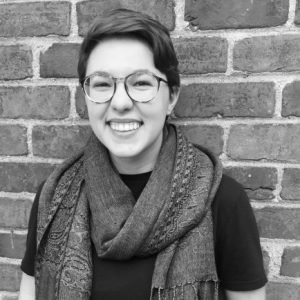 Miranda Rosenblum is a student at the University of Richmond studying American Studies and Women, Gender, & Sexuality Studies. On campus, they currently serve on the search committee for the new Associate Director of LGBTQ Campus Life and participate in the student government as a senator. They’ve been involved in other activism projects at UR and around the city of Richmond, notably ART 180’s Performing Statistics and the digital exhibition A Walk in Her Shoes (awalkinhershoes.org). Miranda loves listening to people’s life stories and reading/watching anything created by queer folks. Some of their favorite things are thrift store sweaters, social justice movements, and a good book. Originally from Connecticut, they currently reside in Richmond, VA.
Miranda Rosenblum is a student at the University of Richmond studying American Studies and Women, Gender, & Sexuality Studies. On campus, they currently serve on the search committee for the new Associate Director of LGBTQ Campus Life and participate in the student government as a senator. They’ve been involved in other activism projects at UR and around the city of Richmond, notably ART 180’s Performing Statistics and the digital exhibition A Walk in Her Shoes (awalkinhershoes.org). Miranda loves listening to people’s life stories and reading/watching anything created by queer folks. Some of their favorite things are thrift store sweaters, social justice movements, and a good book. Originally from Connecticut, they currently reside in Richmond, VA.

